General News
North Korea nuclear tests: US and China to co-operate
China and the United States will work together to try and prevent further missile tests by North Korea, US President Barack Obama says.
In recent weeks, North Korea has carried out a hydrogen bomb test and repeatedly test-fired missiles.
Mr Obama met Chinese President Xi Jinping on the sidelines of a nuclear summit in Washington on Thursday.
But hours later, South Korea's Yonhap news agency said the North appeared to have test-fired another missile.
The latest test saw what appeared to be a ballistic missile land off the east coast of the Korean peninsula, Yonhap reported.
Mr Obama said he and Mr Xi were seeking to agree "how we can discourage action like nuclear missile tests that escalate tensions and violate international obligations".
Mr Xi, quoted by China's state news agency Xinhua, said it was critical all parties "fully and strictly" implemented newly-agreed sanctions. China is North Korea's closest ally and largest trading partner.
Zheng Zeguang, China's assistant foreign minister, said the presidents had a "candid and in-depth exchange of views on a variety of issues...and reached an important consensus". He called the meeting "positive, constructive and fruitful".
North Korea's nuclear test on 6 January and a satellite launch on 7 February were violations of existing UN sanctions.
Since then, the UN and Washington passed further sanctions on Pyongyang. The UN steps were drafted with support by China and reportedly came after two months of negotiations between Beijing and Washington.
Previous UN sanctions imposed after North Korean tests in 2006, 2009 and 2013 did little to dispel its nuclear ambitions.
Much of the burden of making sure the sanctions are implemented is falling on China.
Under the new measures, any North Korean ships arriving in China must be inspected for contraband and imports halted if there is proof profits from those exchanges go towards the North's nuclear programme.
Washington has long pushed for Beijing to put more pressure on North Korea. A White House statement in February said China's "unique influence over the North Korean regime" gave it the chance to do so.
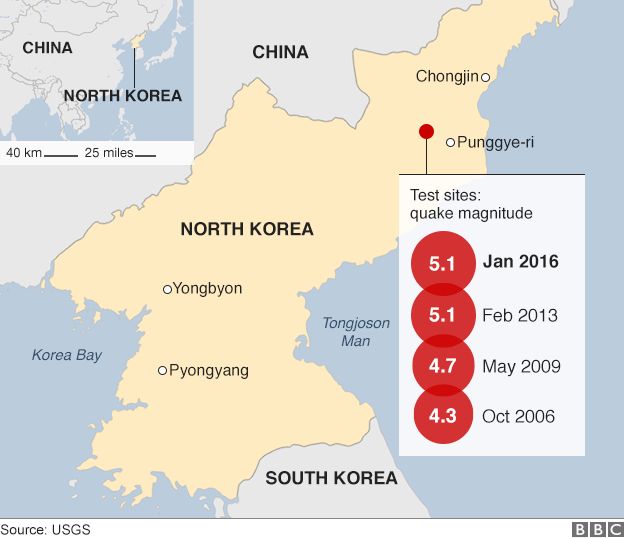
China's foreign ministry last week said it was keen to push for wider talks on North Korea, involving a number of regional powers, during the meeting with Mr Obama. There was no confirmation whether new talks were agreed on Thursday.
Mr Obama also vowed to closely work on the same issue with its allies South Korea and Japan after meeting their leaders on Thursday.
"We are united in our efforts to deter and defend against North Korean provocations," he said.
Source: bbc.com
- Read more
-
01/Apr/2016
India Kolkata flyover collapse: Dozens remain trapped
Rescuers have worked through the night to reach dozens of people believed to be trapped under a collapsed flyover in the Indian city of Kolkata (Calcutta).
The bypass was under construction in the Girish Park area when it collapsed suddenly on Thursday night.
At least 23 people were killed and scores were injured.
The 2km-long (1.2 mile) flyover had been under construction since 2009 and missed several deadlines for completion.
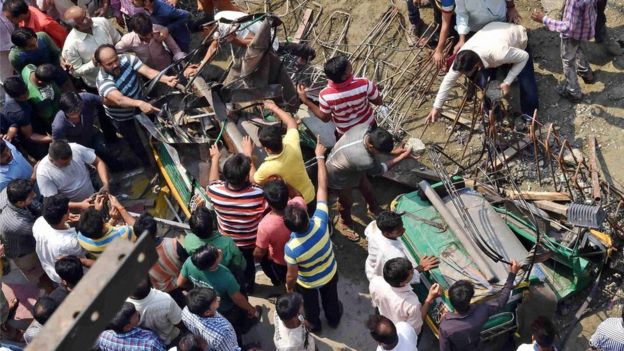
Volunteers initially used bare hands to try to reach people trapped under the rubble
The cause of the disaster was not immediately clear, but safety issues such as lack of inspections and the use of substandard materials have plagued construction projects in India.
The company in charge of the construction, IVRCL, said it would co-operate with investigators. However one of its senior officials said in a news conference that the collapse had been "an act of god" as the company had a good safety record.
India's collapsing building problem
The flyover was in one of Kolkata's most densely populated neighbourhoods, with narrow lanes, and shops and houses built close together, making it difficult to get heavy equipment to the scene.
The BBC's Rahul Tandon in Kolkata described chaotic scenes on Thursday night, with officials trying to clear the area in case the structure collapsed further.
CCTV footage posted on social media appears to show the moment a 100-metre section of the structure collapses, hitting passers-by, auto rickshaws and nearby buildings.
Witnesses said other cars, buses and lorries were also hit. People are said to have been living in makeshift homes under the flyover.
Emergency teams are using sniffer dogs, concrete cutters, drilling machines and sensors to detect life, a rescue official told AFP news agency.
A spokesman for the National Disaster Management Authority (NDRF), Anurag Gupta, told AFP that soldiers and NDRF personnel were at the scene alongside hundreds of police and local officials.
The chief minister of West Bengal, Mamata Banerjee, has said the authorities will take "stringent action" against those responsible for the disaster.
A recurring tragedy

- August 2015: At least 11 people die after a building collapses near India's western city of Mumbai
- July 2015: Five killed after a four-storey building collapses in Delhi
- April 2013: 74 people die after a high-rise residential building in Mumbai collapses
- June 2014: At least 10 people killed when a three-storey building in Delhi collapses
- June 2014: At least 60 people killed when a building collapses in a Chennai suburb
- November 2010: 69 killed and more than 80 injured in a collapse in Delhi
- September 2009: Chimney of a power plant in Chhattisgarh caves in, killing 40 people
Other building collapses in India
Source: bbc.com
- Read more
-
01/Apr/2016
Hull set for City of Culture mass nude photograph
Hull has been chosen as the latest place to stage a mass nude gathering, all in the name of art.
Internationally-renowned photographer Spencer Tunick is to create a new work there to celebrate its year as UK City of Culture.
The gathering is to be photographed in the East Yorkshire port on 9 July, with the resulting work unveiled in 2017.
Organisers hope hundreds of people will strip to become part of the work, entitled Sea Of Hull.
Participants are to be covered in cosmetic body make-up, before assembling to form the multiple colours of the sea and create abstract shapes for the camera.
New York-based Tunick has created more than 90 similar human installations worldwide, including at the Sydney Opera House, Place des Arts in Montreal, Mexico City and Munich in Germany.
His work in the UK has used places including Gateshead and Folkestone as backdrops.

Tunick hopes people will help create "a sea of humanity flooding the urban landscape".
"I'm very interested in the history of the city and its place as a seafaring centre and its relationship to a rich maritime past," Tunick said of Hull.
"It intrigues me that in some places where there are major streets or parks today, previously there was water."
He said he hoped he would create "a sea of humanity flooding the urban landscape" and the body paint would help many people to overcome their inhibitions to posing naked.
Kirsten Simister, of Hull's Ferens Art Gallery, said: "It's an opportunity to involve people directly in an amazing live performance that will temporarily transform the city."
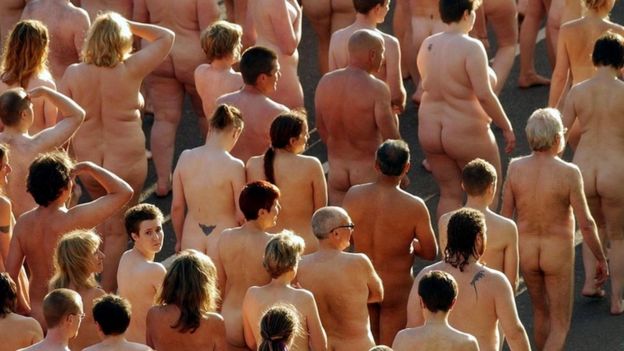
Tunick's UK work has included photographing mass events in Gateshead and Folkestone
The artist is to also create a second installation on 10 July inviting a select group of participants to take part in another event in North Lincolnshire.
Anyone over 18 can take part.
Source: bbc.com
- Read more
-
31/Mar/2016
US to increase military presence in eastern Europe
The US is boosting its troop presence in eastern Europe in response to an "aggressive Russia", the military says.
An extra armoured brigade is being deployed, meaning a total of three will be there on a continuous basis.
The BBC's diplomatic correspondent says it is the most significant US reinforcement of Nato since tensions flared over Russian action in Ukraine.
Last month the Pentagon announced plans to quadruple its budget for European defence in 2017.
The additional presence will increase US ability to conduct military exercises in the region.
The plan demonstrates "our strong and balanced approach to reassuring our Nato allies and partners in the wake of an aggressive Russia in eastern Europe and elsewhere", said Gen Philip Breedlove, the senior US commander in Europe.
"Our allies and partners will see more capability. They will see a more frequent presence of an armoured brigade with more modernised equipment in their countries," he added.
'Division's worth of stuff'
Each brigade will rotate through the region for nine months before being replaced.
There are about 4,200 soldiers in a brigade, bringing with them military vehicles and other equipment.
"There will be a division's worth of stuff to fight if something happens," Deputy Secretary of Defence Robert Work told the Wall Street Journal.
Relations between Russia and the West have plummeted since Russia annexed the Ukrainian peninsula of Crimea in March 2014.
The intervention sparked fears that Russia was considering other incursions into neighbouring countries.
British Foreign Secretary Philip Hammond told Reuters on Wednesday the situation in Ukraine had "gone backwards over the last few months, with more and more violations of the ceasefire".
Russia has accused Nato of using the situation in Ukraine as an excuse to move closer to Russian borders.
"Stories are being spread that Russia will send its tanks into the Baltic states, into Sofia or into Budapest. No-one intends to do that," Russia's Deputy Defence Minister Anatoly Antonov told German public broadcaster Deutsche Welle.
Some analysts suggested the US military could be planning for the post-Obama era.
The frontrunner to be the Republican nominee for the presidential election, Donald Trump, has strongly attacked the economic cost of US foreign policy.
US military presence in Europe
EUCOM - the US European Command - aims to support "enduring stability and peace" on the continent
62,000
US service personnel are permanently based in Europe
-
25,000 of these are army soldiers
-
4,200 more under new plan
-
21 US bases across Europe
- Read more
-
31/Mar/2016
'Drastic' Antarctic melt could double global sea-level rise
Global sea levels could rise by more than double the current best estimate, according to a new analysis of climate change in Antarctica.
The modelling assessment says that Antarctic melting alone could contribute more than a metre to sea level by the end of this century.
By 2500, according to the study, the same source could cause levels across the world to rise by 13m.
The authors say that rapid cuts in carbon emissions could limit this risk.
Competing ideas
In 2013, the Intergovernmental Panel on Climate Change (IPCC) predicted that, without any restrictions on carbon emissions, the seas around the world likely rise by up to 98cm by 2100.
However, the IPCC estimates contained a minimum contribution from Antarctica.
Other analyses since then have projected bigger increases, with a recent study suggesting that the oceans were rising faster than at any time in the past 2,800 years and by 2100 they could be up to 1.31m higher.
The exact level of Antarctica's impact on these projections has been vigorously debated. Late last year, a research paper suggested that projections of a contribution of a metre or more were not plausible.
But this new study argues that by 2100 the world could see 1.14m of sea-level rise from Antarctica alone.
Additions to the model
The scientists say that their model is able to provide a more accurate prediction because it incorporates the impacts of some physical processes for the first time.
While other models have focussed on the impact of warmer waters melting the ice shelves from below, this new study also includes the effect of surface melt-water and rain trickling down from above and fracturing supporting ice, hastening its slide to the sea.
The model also calculates the impact of the disintegration of floating ice shelves. If this happens, it will reveal walls of ice so tall that they cannot support their own weight.
The scientists involved expect that these extra factors will kick in over the coming decades, as warming from the atmosphere (not just from warmer waters below) becomes the dominant driver of ice loss.
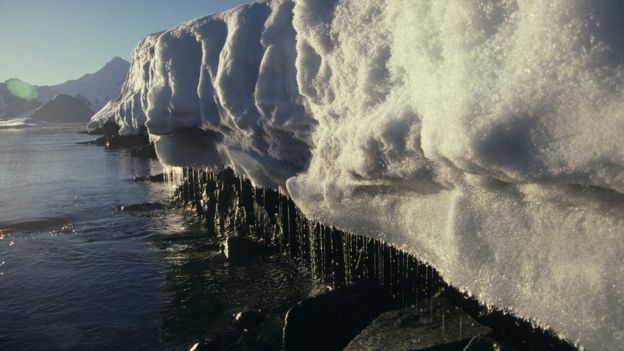
The collapse of ice cliffs could be a significant factor in the new projection
"One reason that other models didn't include the atmospheric warming is because it hasn't started to happen just yet," said co-author Dr David Pollard from Penn State University, US.
"In Antarctica, around the edges at sea level, it's just beginning to get up to the melt point in summer.
"With that warming, the flanks of Antarctica will start to melt drastically in about 50 to 100 years - and then it will start to kick in according to our model."
The authors believe that they have demonstrated the accuracy of the new model by correctly replicating sea-level rise in warm periods, millions of years into the past.
"Recently, we looked at the long-standing problem posed by geological evidence that suggests sea level rose dramatically in the past, possibly up to 10 to 20 metres around 3 million years ago, in the Pliocene," said Dr Pollard.
"Existing models couldn't simulate enough ice-sheet melting to explain that."
'Right questions'
If the world continues to emit "business as usual" levels of carbon dioxide over the coming decades, the scientists argue that sea-level rise will be double what has already been estimated for the coming 100 years.
"If these processes do kick in and they end up being as important as we think that they could be, then they really do have a big impact," said Prof Robert DeConto from the University of Massachusetts, Amherst.
"West Antarctica is responding very soon in these simulations and that ends up having a big impact on North America in particular."
Other researchers have praised the development of the new model for including impacts such as surface melt water and ice-cliff collapse, but they are uncertain about the conclusions.
"I have no doubt that on a century to millennia timescale, warming will make these processes significant in Antarctica, as well as Greenland, and drive a very significant Antarctic contribution to sea-level rise," commented Prof David Vaughan of the British Antarctic Survey.
"The big question for me is, how soon could this all begin, and could it be early enough to drive substantially higher sea levels by 2100? I'm not sure, but these guys are definitely asking the right questions."
The authors believe that there is "good news" in their report. If global emissions of carbon are curtailed significantly then the extra factors that substantially boost Antarctic melting will be avoided.
Seas will continue to rise, but not at the runaway rates suggested by this paper, which has been published in the journal Nature.
Source: bbc.com
- Read more
-
31/Mar/2016
Governor of Georgia vetoes 'religious freedom' bill
The governor of the US state of Georgia has vetoed a "religious freedom" bill after facing pressure from business interests.
The bill would have allowed faith-based organisations to refuse service to gay and transgender people.
Disney, the National Football League, Coca-Cola and others threatened to pull business out of the state.
The veto comes as other US states enacted similar laws that limit gay rights.
"I believe it is a matter of character for our state," Governor Nathan Deal said.
"I do not think that we have to discriminate against anyone to protect the faith-based community in Georgia."
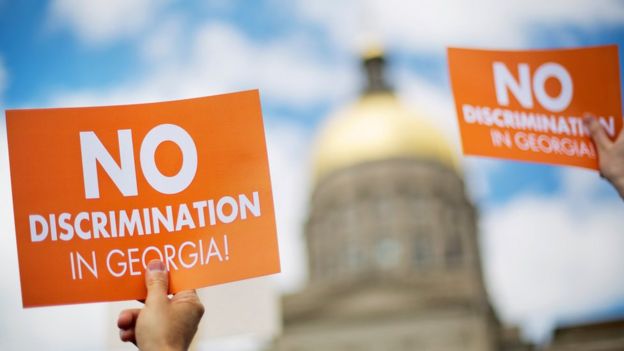
Republicans lawmakers said the bill would protect religious people who believe serving gay and transgender people violates their beliefs.
The bill also would have protected clergy not wishing to perform gay marriages, and people who would not attend weddings based on religious beliefs.
If passed, opponents said it would have legalised discrimination and flattened ordinances passed to protect gay and transgender people.
Mr Deal said his decision was "about the character of our state and the character of our people. Georgia is a welcoming state; it is full of loving, kind and generous people."
Disney said it would not shoot films in Georgia if the bill became law.
"Disney and Marvel are inclusive companies, and although we have had great experiences filming in Georgia, we will plan to take our business elsewhere should any legislation allowing discriminatory practices be signed into state law," a Disney spokesman told Variety last week.
Warner Bros and cable network AMC released a similar statement last week. AMC produces the hit show The Walking Dead, which is filmed in the state.
Atlanta Falcons owner Arthur Blank denounced the bill, and the National Football League said passing the bill would have hurt Atlanta's chances of hosting the Super Bowl.
"The message to Governor Nathan Deal was loud and clear: this deplorable legislation was bad for his constituents, bad for business and bad for Georgia's future," said Chad Griffin, president the Human Rights Campaign, a leading gay rights group. "Discrimination and intolerance have no place in the 21st century,"
Republican State Senator Josh McKoon said he was "disappointed" and thought Mr Deal was someone "the faith community could rely on".
After the US Supreme Court legalised same-sex marriage last year, many conservative states drew up laws in an attempt to protect the religious community.
Last week, North Carolina's legislature passed a sweeping bill that bars its cities and counties from having their own anti-discrimination rules.
Legislators pushed for the bill after Charlotte passed an ordinance allowing transgender people to use restrooms according to gender identity.
Lawmakers in several other US states have proposed similar legislation - sometimes referred to as "bathroom bills".
The North Carolina law has also drawn criticism from the business community with Charlotte-based Bank of America, Apple and other large companies expressing concern about the law.
On Monday, a federal lawsuit was filed against the governor of North Carolina over the new law.
Two transgender men along with the two civil rights groups filed the lawsuit, asking a judge to declare the law unconstitutional.
Source: bbc.com
- Read more
-
28/Mar/2016
UAE fire: Huge blaze hits Ajman residential tower
A large fire has hit a residential tower in the United Arab Emirates, police say, in the third such incident in a little more than a year.
The fire struck the tower in the emirate of Ajman, north of Dubai, the region's police said on Twitter.
Reports in the UAE say there were no casualties, and that everyone was evacuated from the tower in al-Sawan.
On New Year's Eve, a large fire engulfed the luxury 63-storey Address Hotel in central Dubai.
The latest fire struck late on Monday in the Ajman One complex, a development of 12 towers with some 3,000 apartments.
Videos posted by Ajman Police on Twitter show flames engulfing most of one side of the tower, reaching several storeys high.
An earlier video shows a large amount of burning debris falling to the ground. The UAE Minister of Interior, Sheikh Saif bin Zayed, visited the scene.
The 2.7bn dirham (£515m; $735m) project had been due to open in 2009, but was completed years later.
In the New Year's Eve hotel blaze, which burned for more than 20 hours, police say 16 people were injured. Planned fireworks at the nearby Burj Khalifa went ahead despite the fire breaking out shortly before.
Police said cladding used on the outside of the building did not meet safety standards.
The blaze was caused by a short circuit in a spotlight, investigators said.
In February 2015, a large fire badly damaged the Torch skyscraper in Dubai, one of the tallest residential towers in the world.
Source: bbc.com
- Read more
-
28/Mar/2016
Brussels attacks: Belgium releases terror murder suspect
A man known as Faycal C, the only person arrested and charged with involvement in the Brussels attacks, has been released for lack of evidence.
Belgian media said the man had been suspected of being the mystery third man in CCTV footage of the bombers.
But a judge found there was no evidence to justify holding him, the prosecutor's office said.
Last Tuesday's attacks on the airport and the city's metro system killed 35 people and injured more than 300.
The attacks were claimed by the Islamic State (IS) militant group.
Of the 35 victims, seven have still to be identified, the country's crisis centre said on Monday (in French).
At least 12 of the victims are foreign nationals from the US, the Netherlands, Sweden, Germany, France, the UK, Italy and China, it said earlier.
The death toll does not include three attackers, two of whom blew themselves up at the airport and one in the metro.
EU institutions based in Brussels will reopen on Tuesday, following the Easter break, "with important additional security measures in place", European Commission Vice-President Kristalina Georgieva said in a tweet.
Belgium terror arrests
A man referred to officially as Facyal C was released on 28 March after being arrested on 24 March in Brussels and charged with "participation in the activities of a terrorist group, terrorist murders and attempted terrorist murders".
Others detained on suspicion of terrorist activity include
- Salah Abdeslam - arrested on 18 March in the Molenbeek district of Brussels. Key suspect in the Paris attacks last November. Charged with "terrorist murder"
- 'Amine Choukri' - arrested on 18 March with Abdeslam, real name not yet known. Also used the alias Monir Ahmed Alaaj. Documented by German police near Ulm in a car with Abdeslam last October. Charged with "terrorist murder" over the Paris attacks
- Rabah N - arrested on 25 March and charged with participating in terrorist activities in relation to a foiled plot to attack Paris
- Abderamane A - shot in the leg and arrested on 25 March at a tram stop in the Schaerbeek area of Brussels. Charged in relation to the foiled plot to attack Paris. Jailed for seven years in France in 2005 and banned from entering France for life aiding in the assassination of Afghan commander Ahmed Shah Massoud in 2001.
- Aboubakar A - arrested on 24 March in a car in Brussels, charged with participating in terrorist activities
- Yassine A, Mohamed B and Aboubaker O - arrested during raids on 27 March and charged with belonging to a terrorist group
'Not substantiated'
In a statement, the Belgian federal prosecutor's office said: "The clues that led to the arrest of Faycal C were not substantiated by the ongoing inquiry.
"As a result, the subject has been released by the examining magistrate."
He had been charged only two days before with "taking part in a terrorist group, terrorist murder and attempted terrorist murder".
Belgian media say the charges remain, even though he has been released.
Belgian public TV and Le Soir daily identified the freed man as Faycal Cheffou, a freelance journalist.
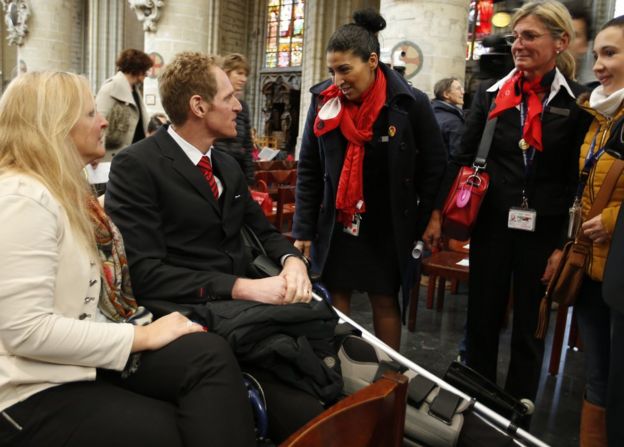
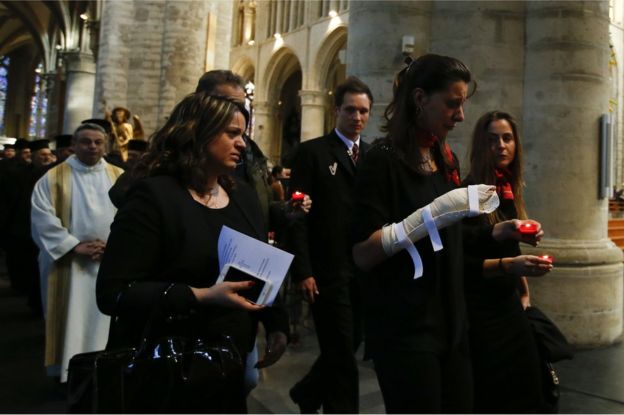
Injured airport workers attended a religious service in Brussels on Monday. The service was held at the Cathedral of St Michael and St Gudula
CCTV footage released by Belgian police on Monday shows the two airport bombers alongside a third man, who is wearing light-coloured clothing and a dark hat. Each is pushing a loaded luggage trolley.
Twin blasts struck the main terminal of Zaventem Airport, in the north-east of the city. A third, even bigger, bomb was abandoned, prosecutors said at the time. It exploded after the security forces had secured the scene and nobody was hurt, they added.
The man in the hat is believed to have fled the scene.
Tuesday's other attack targeted the Maelbeek metro station in the city centre, close to several EU institutions.
Brussels was the second large-scale attack on an EU capital city claimed by IS, after gunmen and bombers killed 130 people in Paris on 13 November.
IS, an extreme Sunni Muslim group known for its ruthless tactics, has seized large tracts of territory in Syria and Iraq in recent years, attracting hundreds of young Europeans to its ranks, many of them Belgians.
Source: bbc.com
- Read more
-
28/Mar/2016
US Capitol shooting: Police shoot armed man at visitor centre
Police shot an armed man as he tried to enter the US Capitol building's visitor centre in Washington, officials said.
A female bystander suffered minor injuries when police fired at the suspect.
Officials said the suspect was known to Capitol police and ABC News reported that the man had disrupted a House session last year.
The massive complex was placed on lockdown, but the security precaution has since been lifted.
US media identified the suspect as 66-year-old Larry Dawson of Tennessee.
In October, he was arrested for interrupting a Congressional session, yelling "prophet of god".
Washington's city police called the shooting an "isolated" incident, saying there is "no active threat" to the public.
Officials originally said a police officer had been hurt, but Capitol Police Chief Matthew Verderosa said no officers were shot.
"There is no reason to believe this is anything more than a criminal act," Mr Verderosa said.
He said the suspect's vehicle was found on Capitol grounds and the weapon was recovered.
The gunman was undergoing surgery at a hospital and his condition was unknown, Mr Verderosa said.
US Congress is on recess for the Easter holiday, but some members of Congress and staff members were on site.
To enter the US Capitol or any Senate or House office buildings, visitors must go through a metal detector and weapons are not permitted.
Mr Verderosa said the suspect pulled out his gun just before being screened by those metal detectors.
Diane Bilo, a woman from Ohio, told the Washington Post her husband heard the shot.
"My husband said he heard a shot followed by a full clip," she said. Multiple members of Congress have posted to social media, reporting that their staff were safe.
In 1998, an attacker shot and killed two police officers at the Capitol. The visitor centre was built as a way to strengthen security after the shooting.
Many tourists are in Washington for the annual Cherry Blossom festival - about 1.5 million people visit the city during the four weeks of the festival.
The White House was also put on lockdown temporarily due to a separate incident.
Source: bbc.com
- Read more
-
28/Mar/2016
FBI-Apple case: Investigators break into dead San Bernardino gunman's iPhone
The FBI has managed to unlock the iPhone of the San Bernardino gunman without Apple's help, ending a court case, the US justice department says.
Apple had been resisting a court order issued last month requiring the firm to write new software to allow officials to access Rizwan Farook's phone.
But officials on Monday said that it had been accessed independently and asked for the order to be withdrawn.
Rizwan Farook and his wife killed 14 people in San Bernardino in December.
They were later shot dead by police. US officials said Mr Farook's wide, Tashfeen Malik, pledged allegiance to the so-called Islamic State on social media on the day of the shooting.
Is this the Israeli firm that hacked the phone?
UN human rights chief backs Apple
Apple boss hits back at FBI conduct
Last week, prosecutors said "an outside party" had demonstrated a possible way of unlocking the iPhone without the need to seek Apple's help.
A court hearing with Apple was postponed at the request of the justice department, while it investigated new ways of accessing the phone.
At the time, Apple said it did not know how to gain access, and said it hoped that the government would share with them any vulnerabilities of the iPhone that might come to light.
On Monday a statement by Eileen Decker, the top federal prosecutor in California, said investigators had received the help of "a third party", but did not specify who that was.
Investigators had "a solemn commitment to the victims of the San Bernardino shooting", she said.
"It remains a priority for the government to ensure that law enforcement can obtain crucial digital information to protect national security and public safety, either with co-operation from relevant parties, or through the court system when cooperation fails," the statement added.
Analysis: Dave Lee, BBC North America technology reporter
A court case that had the US technology industry united against the FBI has, for the time being, gone away.
Now this debate moves into more uncertain times. The US government has knowledge of a security vulnerability that in theory weakens Apple devices around the world.
To protect its reputation, Apple will rush to find and fix that flaw. Assuming it can do that, this row is back to square one.
An Israeli newspaper last week reported that data forensics experts at cybersecurity firm Cellebrite, which has its headquarters in Israel, are involved in the case.
Cellebrite told the BBC that it works with the FBI but would not say more.
Its website, however, states that one of its tools can extract and decode data from the iPhone 5C, the model in question, among other locked handsets.
The court order had led to a vigorous debate over privacy, with Apple saying allowing officials access to users' data would set a "dangerous precedent".
The company received support from other tech giants including Google, Microsoft, and Facebook.
And earlier this month, Zeid Raad al-Hussein, the UN high commissioner for human rights, warned enforcing the order risked opening a "Pandora's box".
FBI director James Comey said it was the "hardest question" he had tackled in his job.
However, he said, law enforcement saved lives, rescued children and prevented terror attacks using search warrants that gave it access to information on mobile phones.
Source: bbc.com
- Read more
-
28/Mar/2016
Top US Navy officer jailed over massive bribery scandal
A high-ranking US Navy captain has been sentenced to nearly four years in jail for passing classified information to a Malaysian defence contractor.
Daniel Dusek provided the information in exchange for luxury hotel stays and the services of prostitutes.
Dusek was also ordered to pay a $70,000 (£50,000) fine and $30,000 in restitution to the navy.
He is the highest-ranking officer to be charged in one of the US military's worst bribery scandals.
Sentencing Dusek in San Diego, California to 46 months in prison, Judge Janis Sammartino said: "It is truly unimaginable to the court that someone in your position with the United States Navy would sell out based on what was provided to you - hotel rooms, entertainment and the services of prostitutes."
Dusek, 49, who pleaded guilty in January 2015 to conspiracy to commit bribery, told the court he would never forgive himself for his actions.
The former captain was among several current and former naval officers charged in the scandal that involved tens of millions of dollars in bribes. At one point, Dusek served as deputy director of operations for the US 7th Fleet.
The man at the centre of the scandal, contractor Leonard Francis, plead guilty in the case last year, admitting that his Singapore-based port services company, Glenn Defence Marine Asia (GDMA), plied Dusek and others with meals, alcohol, luxury hotel stays and other gifts to ensure US Navy ships stopped at ports where GDMA operated.
In one instance, Dusek arranged for an aircraft carrier - the USS Abraham Lincoln - to stop at Port Klang, Malaysia, a port terminal owned by Francis. The 2010 port visit cost the United States about $1.6 million, officials said.
"Captain Dusek's betrayal is the most distressing because the navy placed so much trust, power and authority in his hands," said US Attorney Laura Duffy.
"This is a fitting sentence for a man who was so valuable that his conspirators labelled him their 'golden asset'," she added.
Source: bbc.com
- Read more
-
25/Mar/2016
Brussels attacks: Belgian police arrest six suspects
Belgian police have arrested six people in Brussels as a major investigation continues into attacks that claimed 31 lives in the city on Tuesday.
The arrests were made in the Schaerbeek district. There is no word yet on the identities of the suspects or their possible connection to the attacks.
Separately, in France, a suspect who was plotting an attack has been arrested near Paris, officials said.
The Brussels bombings have been linked to last November's Paris attacks.
So-called Islamic State (IS) has claimed the attacks in both Paris and Brussels.
More about the attacks
Why have jihadists targeted Belgium?
Why Brussels warning signs were missed
From Paris to Brussels: Why the attacks are linked
The arrests in Schaerbeek were made late on Thursday, and followed house-to-house searches in the area.
Also on Thursday evening, French police launched an anti-terror operation in Argenteuil, north-west of Paris, following the arrest hours earlier of a man suspected of planning an attack.
Interior Minister Bernard Cazeneuve said the suspected militant, of French origin, was in an "advanced stage" of a plot, adding that no connection had been made to either the Brussels or the Paris attacks.
Last November, 130 people died after militants opened fire and detonated bombs in a number of locations in the French capital.
Earlier on Thursday, Belgium admitted that it had made "errors" relating to one of the Brussels attackers.
Turkey has said it arrested and deported Brahim el-Bakraoui last June, warning Belgium he was a "foreign fighter" - but was "ignored". The Dutch authorities had also been alerted, Ankara said.
The Belgian interior and justice ministers said they had offered to resign over this but added that the prime minister refused to let them.
Brahim el-Bakraoui is one of three men - pictured in the middle on a CCTV image of them - who carried out the bombings at Zaventem airport that killed 11 people.
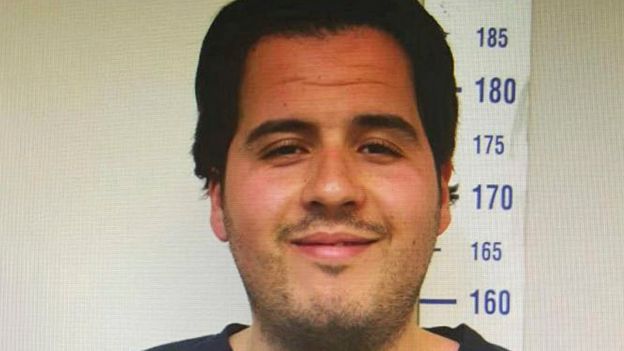
Brahim el-Bakraoui was arrested in Gaziantep on the Turkey-Syria border
Unconfirmed reports say another of the Brussels airport attackers was the wanted jihadist Najim Laachraoui, whose DNA was found on explosives linked to the attacks in Paris.
The third suspected airport attacker has not yet been identified and is on the run.
Bakraoui's brother, Khalid, struck at Maelbeek metro station, where 20 people died.
There are reports of a second suspect being sought for that attack. One source told AFP news agency that a man with a large bag had been seen beside Khalid el-Bakraoui on surveillance footage at the metro station.
Meanwhile, VRT reported that investigators were working on the assumption that the cell had been planning a far bigger attack, involving Paris-style shootings as well as suicide bombings.
Links have also emerged with Salah Abdeslam, a suspect in the Paris attacks.
Abdeslam was arrested and wounded in a police raid on a flat in the Forest area of Brussels last Friday - four days before the attacks in the Belgian capital.
Investigators say Khalid el-Bakraoui used a false name to rent the same flat.
On Thursday, Abdeslam's lawyer said he had changed his mind and would not fight extradition from Belgium to France.
Abdeslam, a 26-year-old French national born in Belgium, did not have prior knowledge of the Brussels bombings and had stopped co-operating with police following the attacks, his lawyer Sven Mary said.
A court hearing on Thursday on the detention of Abdeslam and two other suspects has been postponed until 7 April.
The director of the EU's police agency, Europol, has told the BBC the network of jihadists in Europe is "more extensive than perhaps we first feared".
Robert Wainwright said there were concerns about "a community of 5,000 suspects that have been radicalised in Europe, that have travelled to Syria and Iraq for conflict experience, some of whom - not all - have since come back to Europe".
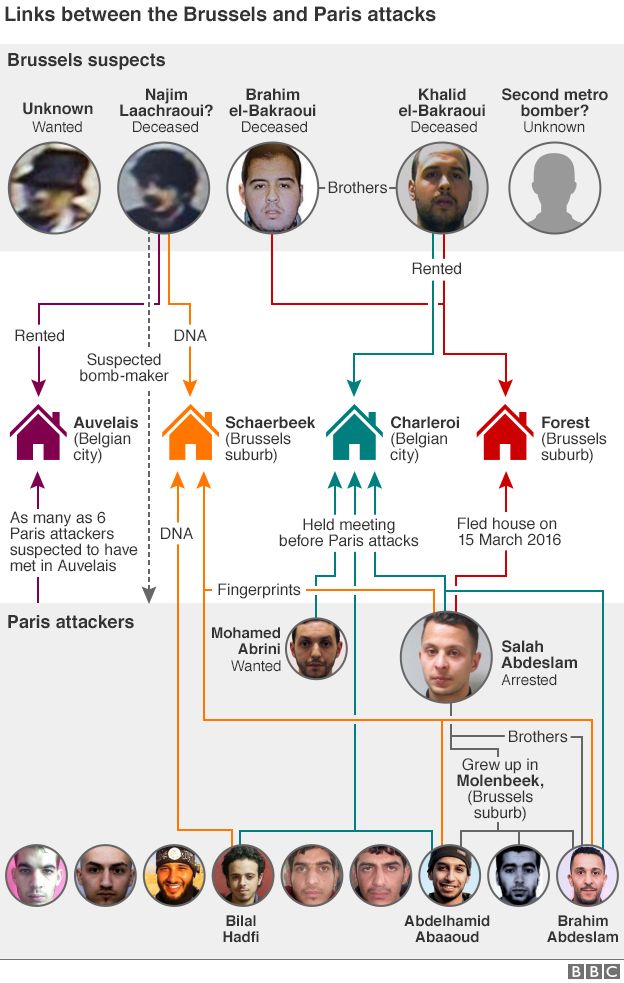
Source: bbc.com
- Read more
-
24/Mar/2016
North Carolina revokes transgender and gay protections
The US state of North Carolina has enacted a law that bars its cities and counties from having their own anti-discrimination rules.
Legislators pushed for the bill after Charlotte passed an ordinance allowing transgender people to use restrooms according to gender identity.
A Republican-controlled General Assembly voted on Wednesday to invalidate the ordinance.
The governor, who signed the bill, called it a matter of "basic privacy".
Governor Patrick McCrory said in a release that "the basic expectation of privacy in the most personal of settings" was violated by "government overreach and intrusion" by Charlotte's city council.
Lawmakers several other US states have proposed similar legislation - sometimes referred to as "bathroom bills".
A Houston anti-discrimination ordinance that offered protections for gay and transgender people was overturned by voters in November.
Democrats in North Carolina's Senate walked off their chamber floor in protest as the bill was being debated. It later passed 82-26.
Republican leaders booked the one-day session for $42,000 (£30,000) because the ordinance was set to take place on 1 April.
Local governments cannot prohibit discrimination in public places based on gender identity and sexual preference under the new law.
"We choose not to participate in this farce," said Dan Blue, a Democratic state senator.
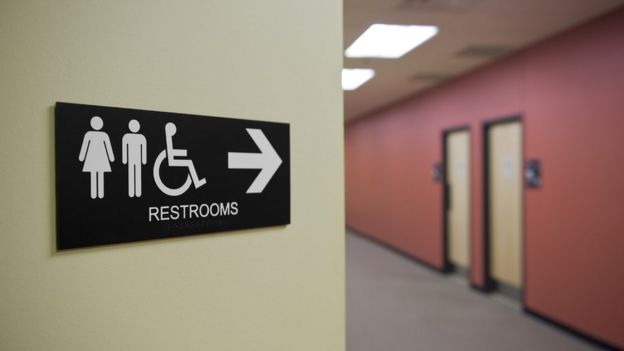
Transgender people in North Carolina must use restrooms that match the gender listed on their on their birth certificate
North Carolina Republicans said they felt it was necessary to intervene to protect women and children from Charlotte's "radical" action, arguing that men could enter women's restrooms by calling themselves transgender.
"It's common sense, biological men should not be in women's showers, locker rooms and bathrooms,'' said Republican representative Dean Arp.
Gay rights advocates said the law places a stigma on the transgender community and spreads dubious claims about increased risk of sexual assault. The law will deny the LGBT community basic protections, the groups said.
"McCrory's reckless decision to sign this appalling legislation into law is a direct attack on the rights, well-being and dignity of hundreds of thousands of LGBT North Carolinians and visitors to the state,'' Human Rights Campaign President Chad Griffin said in a statement. "Civil liberties groups pledged to push for repeal and were weighing legal options."
The law requires public schools, government agencies and college campuses bathrooms and locker rooms marked by gender. Transgender people in North Carolina now must use restrooms that match the gender listed on their on their birth certificate .
Source: bbc.com
- Read more
-
24/Mar/2016
Ghana's US Embassy To Issue Travel Certificates Instead of Visas
The Ghana Embassy in the United States has directed individuals wishing to travel to the West African country to apply for Travel Certificates instead of Visas as they work to resolve the passport-printing crisis that has bedeviled the outfit.
The embassy has been unable to print passports for a long while causing massive discomfort to Ghanaians and other travelers seeking to come to the oil producing country. Starr News sources say most travelers, especially Ghanaians seeking to go home for the Easter festivities have been left stranded.
The embassy has not yet disclosed the reasons for the failure to print passports.
However in a notice posted at its premises, the embassy said it is working round the clock to fix the challenge which has existed since last year.
Below are details of the notice
The embassy of Ghana hereby informs that due to technical challenges the issuance of Ghana passport is temporary on hold.
Whiles we work tirelessly to resolve this challenge, the embassy takes this opportunity to express our sincere apologies for the inconvenience.
You may have to apply for travel certificate in writing. Now this comes with its own issues.
1.Not all airlines accept travel certificates
2.You can only use it for a one way trip to Ghana only
3.You will have to make your own arrangement to get a passport once you get to Ghana
4.The fee for travel certificate is $50
Source: starr FM
- Read more
-
23/Mar/2016
MH370 search: Mozambique debris 'almost certainly' from missing plane
Australia's transport minister says two plane parts found in Mozambique "almost certainly" came from missing Malaysian Airlines flight MH370.
The two pieces of debris were found separately by members of the public and were flown to Australia for analysis.
Darren Chester said the finds were "consistent with drift modelling" of how debris from the missing plane may have been carried by ocean currents.
MH370 vanished in March 2014 with 239 people on board.
It was flying from the Malaysian capital Kuala Lumpur to Beijing and is widely believed to have gone down in the Indian Ocean after veering off course.
The fate of the plane, its passengers and crew remains one of aviation's biggest unsolved mysteries.
The only confirmed piece of debris found so far has been a section of wing called a flaperon, which was found on the Indian Ocean island of Reunion.
'Search continues'
One of the parts retrieved in Mozambique was found on a sandbank by an amateur US investigator in late February and the other in December by a South African tourist.
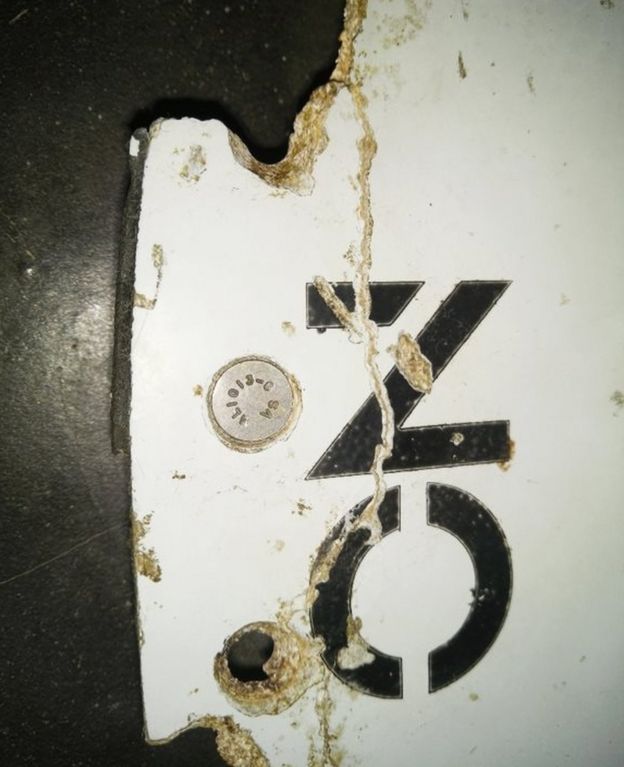
Mr Chester said the investigation team had finished examining the debris and found both were "consistent with panels from a Malaysia Airlines Boeing 777 aircraft".
"The analysis has concluded the debris is almost certainly from MH370," he said in a statement.
He said it showed that the vast deep-sea search for the plane in the southern Indian Ocean, being led by Australia, was focusing on the right place.
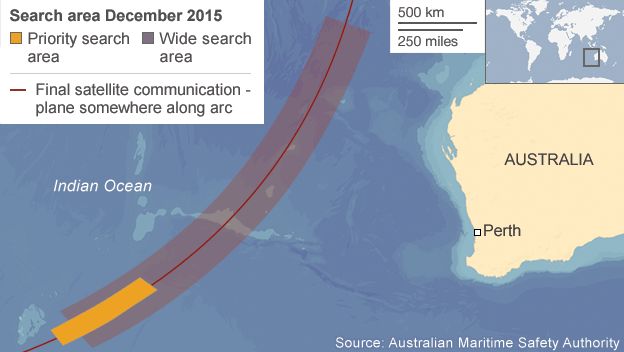
The search, also involving experts from China and Malaysia, is scanning the sea floor, much of it previously unmapped, in the hope of locating the wreckage.
Mr Chester said it would continue for now, with 25,000 sq km (10,000 sq miles) of ocean still be to searched.
"We are focused on completing this task and remain hopeful the aircraft will be found."
But the three countries have said that barring significant new evidence, they will end the operation once the area has been fully searched. The search is expected to be completed in the coming months.
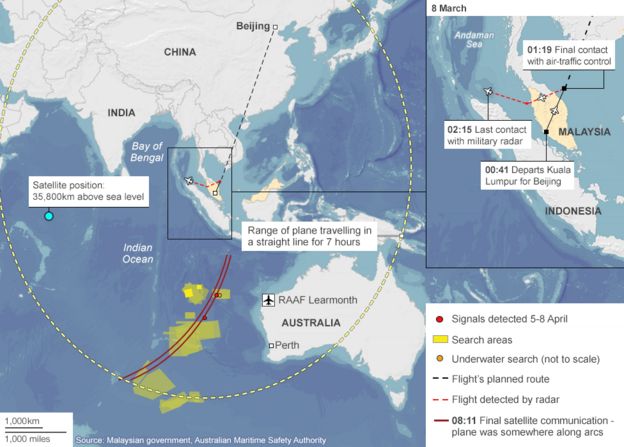
Source: bbc.com
- Read more
-
23/Mar/2016
Moon used to spin 'on different axis'
The Moon used to spin on a different axis and show a slightly different face to the Earth, a new study suggests.
Using data collected by Nasa's Lunar Prospector mission in the late 1990s, scientists spotted two hydrogen-rich regions near the Moon's poles, probably indicating the presence of water ice.
The icy patches are opposite each other - the line between them passes through the middle of the Moon - so it appears that this used to be its spin axis.
The work appears in the journal Nature.
It describes a gradual wobble, or "true polar wander", adding up to about a six-degree shift altogether.
A likely explanation for this shift, which the researchers suggest took place over several billion years, is volcanic activity in a region called the Procellarum.
This swathe of territory includes most of the Moon's dark patches that are visible from the Earth. Volcanoes and associated geological activity would have made it warmer and lighter than the rest of the Moon.
According to Matt Siegler, from the Planetary Science Institute in Arizona, and his colleagues, that drop in density produced enough wobble to explain the two "palaeopoles" they detected in the Lunar Prospector data.
"The Procellarum region was most geologically active early in lunar history, which implies that polar wander initiated billions of years ago," they write.

The presumed icy patches are opposite each other, nearby the present lunar poles
Dr Siegler and his colleagues discovered the hydrogen-rich patches in data from the Lunar Prospector's neutron spectrometer: measuring the neutrons bounced off the Moon's surface by incoming cosmic rays.
That hydrogen signal is taken to indicate the presence of water ice, which can - and does - exist in permanently shaded craters at the Moon's poles.
Precisely why it has persisted in these regions, which have now drifted away from the poles and into sunlight, is a mystery.
The researchers suggest it may have been buried by asteroid impacts, but this will require further investigation.
Previous studies have suggested that the Moon may have wobbled around to an even greater extent - perhaps as much as 35 degrees.
The lead author of one of those earlier papers, Ian Garrick-Bethell from the University of California Santa Cruz, wrote in a comment piece for Nature: "A key goal will be to reconcile these many stories of the changing orientation of the Moon, and to determine what density changes drove it to wander."
Source: bbc.com
- Read more
-
23/Mar/2016
Brussels attacks: Scores remain critical after bombings
Scores of people remain in intensive care following suicide Tuesday's bomb attacks in Brussels that left 31 people dead, Belgium's health minister says.
Maggie de Block said that of about 300 wounded people, 61 were still in a critical condition, and suggested that the death toll could rise further.
Earlier, prosecutors confirmed they had identified two of the four attackers as brothers Khalid and Brahim el-Bakraoui.
Two other attackers have yet to be named. One died, another is on the run.
Brahim el-Bakraoui blew himself up in the attack at Zaventem airport that killed 11 people while Khalid struck at Maelbeek metro, where 20 people died, prosecutors said.
Unconfirmed reports say another of the attackers was the wanted jihadist Najim Laachraoui, who is thought to have links with last year's attacks in Paris.
So-called Islamic State (IS) has said it was behind the attacks.
EU interior and justice ministers are due to hold a crisis meeting in Brussels on Thursday to discuss their response to the bombings.
More about the attacks
Ms de Block said in a statement (in French) that the injured were from 40 nationalities, and 150 were still being treated in hospitals across Belgium.
Many are suffering from burns or wounds normally seen on a battlefield, such as shrapnel injuries. The death toll, the statement said, was still "provisional".
Ms de Block added that four patients were in a coma and had not yet been identified, which was delaying the process of naming victims.
Belgium's king and queen visited the airport on Wednesday and also met some of those injured in the attacks. A minute's silence was held at midday.
Federal Prosecutor Frederic Van Leeuw said Brahim el-Bakraoui had been identified as the middle of three suspects caught in a CCTV image at the airport.
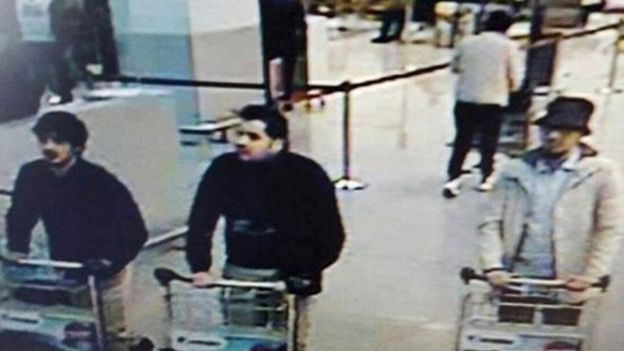
The airport CCTV image. The man on the left has not been officially identified and is believed to have died. Brahim el-Bakraoui is in the middle and was also killed. The man on the right has not been identified and is on the run
The man on the left is believed to have died at the airport. The man on the right, wearing the hat, is thought to have fled the scene.
Mr Van Leeuw said the man in the hat had left a bag containing "the biggest bomb", which later partially exploded after police had evacuated the terminal, injuring no-one.
Reports in Belgian and French media suggest the man on the left is Najim Laachraoui, but this is not confirmed. Analysts say Laachraoui is believed to be a key bomb maker, and French media say he played a key role in the terror attacks in Paris.
Mr Van Leeuw said a taxi driver had told police he had picked up the three men from an address in the Schaerbeek area of Brussels.
The apartment was raided later on Tuesday and bomb-making materials, including 15kg (33lb) of high explosive, were found.
A note from Brahim el-Bakraoui was found in a nearby rubbish bin. In it, he wrote: "I'm in a hurry (...) they're looking for me everywhere. I'm not safe any more. If I give myself up they'll put me in a cell."
Mr Van Leeuw said the brothers, who were Belgian nationals, were known to police and had criminal records. They were identified by DNA records.
Broadcaster RTBF quoted a police source saying that Khalid el-Bakraoui had used a false name to rent a flat in the Forest area of Brussels where police killed a gunman in a shootout last week.
It was during that raid that detectives found a fingerprint of Salah Abdeslam, the main suspect in the Paris terror attacks of 13 November.
He was arrested in a raid in Brussels last Friday.
Turkey said on Wednesday that Brahim was detained by Turkish officials on the border with Syria in June 2015 and deported to the Netherlands.
President Recep Tayyip Erdogan said Belgium had "ignored our warning that this person is a foreign fighter".
Belgian Justice Minister Koen Geens said he was aware that the suspect had been deported from Turkey but denied that he had been flagged as a possible terrorist.
Belgium has raised its terrorism alert to the highest level, and its international airport will remain closed on Thursday.
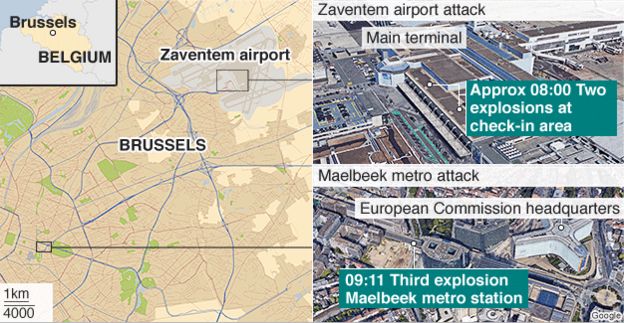
Source: bbc.com
- Read more
-
23/Mar/2016
Brussels explosions: Why has Belgium's capital been attacked?
These are the darkest days Belgium has known since World War Two, according to one Belgian politician.
The attacks, claimed by jihadist group Islamic State (IS), murdered people at Brussels international airport and in a metro train in the heart of the Belgian capital.
And the targets were among the most sensitive in Europe. Brussels is home to the EU, Nato, international agencies and companies, as well as Belgium's own government.
Why has Brussels been attacked?
Not only is Brussels a high-profile target for Islamists, Belgium has struggled with Islamist groups for years and hundreds of its citizens have been lured into fighting for IS in Syria and Iraq.
Several cities have housed Islamist cells, but the most active have been in Brussels and in the south-western suburb of Molenbeek in particular - an area with a high ethnic Moroccan population.
Several of the bombers and gunmen who targeted Paris last November, killing 130 people, had been living in Molenbeek. The main suspect not to die in the Paris attacks, Salah Abdeslam, returned to Belgium the day afterwards and managed to evade police until 18 March. He and an accomplice were captured alive, again in Molenbeek.
Many Belgians were expecting a response from jihadists. "I had certainly expected something else would take place, but not that it would happen on this scale," says Belgian jihadism expert Pieter Van Ostaeyen.
More about the attacks
Pre-planned attacks or revenge?
So were Tuesday's bombings retaliation for last Friday's success in capturing two Islamists alive? The arrests were clearly a blow to IS and Belgian jihadists.
Abdeslam has been described as the logistics expert in the Paris attacks. He rented flats, drove militants across Europe and bought bomb-making equipment. Days before his arrest, an accomplice who had been hiding with him, Mohamed Belkaid, was shot dead by police. He had been wrapped in an IS flag.
"What seems likely is that attacks were already being planned and due to specific arrests they were accelerated because the terrorists knew they were being hunted," says Prof Dave Sinardet of Vrije Universiteit Brussel (Free University Brussels).
In fact Brussels had already tried to guard against multiple attacks following an apparent threat 10 days after the Paris attacks. For several days the city went into lockdown, much as it did on Tuesday, with public transport at a standstill and people told to avoid travelling around.
Did Belgium's security forces fail?
Heavily armed men were able to enter the airport at Zaventem, open fire and blow themselves up. An hour or so later another man was able to enter a metro train a stone's throw from the headquarters of the EU and blow himself up.
Security forces had a dry run in November, the terror threat was at its second highest and soldiers were already deployed on the streets of several cities.
A beleaguered police force has clearly buckled under the weight of an almost non-stop Islamist threat. And yet it suffers from institutional problems too.
Brussels is a relatively small European capital, and yet it still has six police zones. Its CCTV system is far less developed than London or Paris.
"It's clear there are inefficiencies in the level of security services. For years we haven't put enough energy into issues of security and terrorist threats," says Prof Sinardet. However, he argues this kind of terrorist attack is very difficult to avert, as witnessed in Madrid, London and Paris.
Are further attacks likely?
For Belgians, this is the most awkward question. Several suspects are still urgently being sought by police.
One of the suspected airport attackers (the man in the hat on the right of the picture) was on the run on Tuesday and police were already actively hunting two other suspects after the Paris attacks who were both accomplices of Salah Abdeslam.
One of the missing Paris suspects is Najim Laachraoui, whose fingerprints were found in the Brussels flat where Paris bombs were made, and the other is Mohamed Abrini, another Belgian Islamist.
After the Paris attacks, US counter-terrorism expert Clint Watts wrote of the "iceberg theory of terror plots": for every attacker, there were usually several others helping to facilitate the plot, but what one saw was just the tip of the iceberg.
Mr Watts believes that the Brussels bombings are the fallout from the Paris attacks. What is not clear is whether those still on the run plan further bloodshed.
Source: bbc.com
- Read more
-
22/Mar/2016
Brussels attacks: Zaventem and Maelbeek bombs kill many
More than 30 people are believed to have been killed and dozens injured in attacks at Brussels international airport and a city metro station.
Twin blasts hit Zaventem airport at about 07:00 GMT, with 11 people reported killed.
Another explosion struck Maelbeek metro station near EU headquarters an hour later, leaving about 20 people dead.
Brussels police have issued a wanted notice for a man seen pushing a luggage trolley through the airport.
He was pictured in CCTV footage with two other suspects who are believed to have died in the blasts.
The Islamic State (IS) group said it was behind the attacks in a statement issued on the IS-linked Amaq agency.
Belgium has raised its terrorism alert to its highest level. Three days of national mourning have been declared.
Prime Minister Charles Michel called the latest attacks "blind, violent and cowardly", adding: "This is a day of tragedy, a black day... I would like to call on everyone to show calmness and solidarity".
'The worst thing I've seen'
Two blasts tore through the departures area of Zaventem airport shortly after 08:00 local time (07:00 GMT).
A suicide bomber was "probably" involved, the Belgian prosecutor said.
Eleven people were killed and 81 wounded in the blasts, Belgian Health Minister Maggie de Block said.
"People were running over others that had fallen, I couldn't breathe. I can't believe I'm alive," 15-year-old Antoine told me as he walked with his school friends in a line of hundreds being escorted on foot and by bus to a sports hall, now a makeshift reception centre.
Three hearses passed, heading towards the ruins of the airport departure hall. People sobbed at the sight of them.
Several tourists were asking police what they should do now, where it was safe to go - and when the airport might reopen.
The police were confused too, but offered what little information they had, telling people to head to a reception centre. An officer repeatedly shouted: "Quickly, keep moving, evacuate, this is serious."
Carnage on the Metro
The metro blast occurred shortly after 08:00 GMT during the rush hour at Maelbeek station.
It struck the middle carriage of a three-carriage train while it was moving away from the platform.
Alexandre Brans told AP: "The metro was leaving Maelbeek station when there was a really loud explosion. It was panic everywhere. There were a lot of people in the metro."
Brussels Mayor Yvan Mayeur said "about 20" people had died and more than 100 had been injured, 17 of them severely.
Eyewitnesses recall explosions
In pictures: Brussels explosions
The station is close to EU institutions. The European Commission, the EU's executive arm, has told employees to stay indoors or at home. All meetings at EU institutions have been cancelled.
Ryan McGhee, a catering worker at a college in Brussels, told the BBC: "The entire city is in lockdown. People are calm at the moment but the atmosphere is tense."
Security raised
Local and international travel has been suspended or disrupted and security tightened across Europe.
All flights have been cancelled. The airport is due to reopen on Wednesday.
Eurostar has cancelled all trains to and from Brussels. The Thalys France-Benelux train operator says the entire network is closed.
In the UK, security has been stepped up at Gatwick and Heathrow airports. The UK Foreign Office has advised British nationals to avoid crowded areas in Belgium.
UK Prime Minister David Cameron chaired a meeting of the Cobra response committee on Tuesday.
In France the cabinet has held an emergency meeting. There is also extra security at Dutch airports.
'Outrageous' attacks
There has been strong international condemnation:
- US President Barack Obama called the blasts "outrageous attacks against innocent people".
- The 28 EU leaders said the bombings were an "attack on our open democratic society" in a joint statement.
- "The terrorists have struck Belgium but it is Europe that was targeted," said French President Francois Hollande.
- Russian President Vladimir Putin called the attacks "barbaric".
Belgium's Interior Minister Jan Jambon had said on Monday that the country was on the highest level of alert for possible revenge attacks after the capture on Friday of Salah Abdeslam, the main surviving suspect from the Paris attacks in November.
Mr Jambon told Belgian radio: "We know that stopping one cell can... push others into action. We are aware of it in this case."
Gaps in intelligence: By Chris Morris, Europe correspondent
European security experts had been braced for another attack for months. But it is always a huge shock when it actually happens.
If this was "revenge" for the arrest of Salah Abdeslam on Friday, it will be a source of considerable concern that a functioning terrorist network was able to respond so quickly and with such devastating effect.
It is possible that a cell linked to Abdeslam brought forward the timing of a future attack because they thought he might blow their cover.
Either way, it shows how advanced the planning was in terms of logistics, explosives, weapons and people willing to carry out such attacks on civilian targets.
The priority now will be to ensure that anyone else who poses an imminent threat to the public is apprehended as soon as possible. But it is clear that there are still huge gaps in intelligence, and Brussels is seen as a soft target.
In the words of French President Francois Hollande, the response from Europe will need to be "calm, lucid and determined" - and it will have to last for a long time.
Source: bbc.com
- Read more
-
22/Mar/2016
Pianist's estranged wife charged with killing daughters in US
The estranged wife of world-renowned concert pianist Vadym Kholodenko has been charged with killing their two daughters in Texas, US officials say.
Authorities suspect Sofya Tsygankova last week killed one-year-old Michela and Nika, five, and stabbed herself at the family home near Fort Worth.
Ms Tsygankova, who is originally from Russia, now faces a mental evaluation. The charge can bring the death penalty.
Mr Kholodenko, a Ukrainian musician, is not a suspect, the officials say.
Last Thursday, Mr Kholodenko, 29, called emergency services after finding his 31-year-old estranged wife in an "extreme state of distress", as well as the bodies of his two children.
The children were found in their beds in Benbrook with no visible signs of trauma. A post-mortem examination will determine the cause of death.
Ms Tsygankova, who also performed as a concert pianist, is currently being treated at local hospital.
On Monday, Benbrook police Commander David Babcock said: "We have probable cause, reason to believe that she committed the homicides."
He added that police had collected physical evidence at the scene.
Mr Kholodenko won the prestigious Van Cliburn International Piano Competition in Fort Worth in 2013 and has performed with a number of major orchestras.
He married Ms Tsygankova in 2010. They moved to Fort Worth from Moscow in 2014.
The couple divorced in November, according to court records.
The children lived with their mother, but Mr Kholodenko would routinely pick up the girls from the home in the mornings, police said.
Source: bbc.com
- Read more
-
22/Mar/2016
About Us
-
Archives
Recent posts
News for people who want to know
- Bakus Radio resource for |Ghana & Africa music |News |Entertainment |Sports | Copyright © 2016 . All Rights Reserved.
- Designed By Fresco Software Solution Pvt. Ltd.



























